Eat, Sleep, Repeat: Body Clock Science
This week - tick tock! We’re talking body clock science! Whether it’s eating, sleeping, or coming down with something - we’re taking a look at the biology of our daily rhythms. Plus in the news, doctors begin testing gene editing to treat cancer, and what have honeybees and love hearts got in common?
In this episode
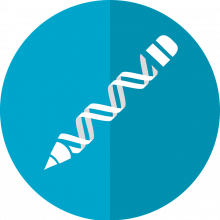
Can CRISPR treat cancer?
Joseph Fraietta, University of Pennsylvania
In a world first in humans, scientists in the US have used the gene editing tool CRISPR to treat patients with cancer. In a proof-of-concept study, the team began by harvesting immune “T” cells from 3 patients with advanced tumours. They then edited the T cells’ genes to re-programme the receptor that the T cells use to recognise hostile targets so that they would then regard the patient’s cancer cells as foreign and destroy them. A gene that normally puts the brakes on cell growth was also disabled, so the T cells should be able to grow and expand their numbers in the body, to keep the cancer under control in the long term. The modified cells were then injected back into the patients, and Katie Haylor heard what happened from Joseph Fraietta...
Joseph - We use the molecular scissors to delete the genes that code for the natural T-cell receptor, so that we can insert the tumour specific T-cell receptor, and thus endow these T-cells with the ability to seek out and destroy the tumour so to speak.
Katie - So it's almost like the guards on the outside of the fortress, they can see the enemy and maybe sound the alarm?
Joseph - Absolutely, yes. And expand and mobilise and kill the tumour as well.
Katie - What exactly is a receptor?
Joseph - A receptor is a molecule on the surface of a T-cell that can recognise tumour specific components, in this case, protein fragments. And so that's how a T-cell knows it's a tumour, and it's triggered to attack and as you said, sound the alarm and expand into this massive army. In this paper, those were two edits that we did to the genome and then we did a third, and there's a specific molecule that T-cells overexpress and it's called PD-1: Programmed death ligand one. And this is overexpressed on T-cells in the context of cancer. And what it does is it sort of puts the brakes on the T-cell response. It prevents that expansion of the army to really take care of this tumour and it also shuts down all of those weapons that the T cell has to really fight the tumor. So the third edit that we did was to delete the gene that codes for this PD-1 protein to take the brakes off of that response.
Katie - What was the result then when you transfuse these T-cells back into these people who had cancer?
Joseph - Remarkably these CRISPR edited, reprogrammed T-cells expanded, and they also persisted and that's very key. We really need them to persist, to do battle with the tumour, and also to sort of hang around should the enemy return.
Katie - From what I understand about cancer actually, uncontrolled proliferation is a bit of a hallmark. Is there any worry about having runaway T-cells?
Joseph - That is a very valid point and that has been documented actually, when other therapies were used to target this specific molecule in the context of cancer. So to prevent that, we carefully monitor the patients during the trial and we're going to continue to monitor the patients very carefully during longterm followup, for any signs of these runaway T-cells, as you put it.
Katie - Where do you go from here?
Joseph - I believe that designing new cellular therapies, using better technologies is the most likely path forward. Given the high costs of these clinical trials and the organisational and logistic challenges, we really owe it to the patients to use the best technologies that are available at the current time, and so CRISPR based gene editing and genome editing, it's just moving forward at such an incredibly fast pace. So I think the next frontier is to use some of the new CRISPR based editing approaches to really improve these so-called designer T-cells, that are the patient's own T-cells that we use to treat their cancer. We hope that this study will help really forge a path for developing “best in class” engineered T cells to treat cancer and hopefully a variety of other diseases.
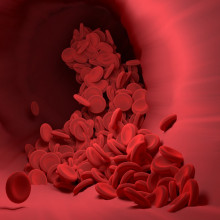
05:42 - The protein behind heart attack plaques
The protein behind heart attack plaques
Ellie Tzima, Oxford University
Scientists have found an important trigger that causes arteries to furr up. This is the disease process called atherosclerosis, where arteries become narrowed by the formation of fatty plaques in the vessel lining. These cause heart attacks and strokes. But how these plaques form in the first place is still a mystery. Now scientists at Oxford University have found that a molecule called Plexin D1, probably starts the whole process off. Adam Murphy heard how from Ellie Tzima...
Ellie - It's been known since the 1960s that plaques are very focal in their distribution, which means that not all arteries and all regions of the arteries will develop a plaque. Some regions are prone to development of a plaque, whereas others are protected and it has to do with the type of blood flow that these regions experience. For example, in areas such as curvatures or bifurcations where vessels split into two, there's irregular blood flow patterns where whirls and eddies form and the endothelial cells, the cells that line blood vessels in those areas, sense this type of disturbed blood flow and they respond accordingly. They start signaling pathways that will ultimately lead to the formation of a plaque.
Adam - This is what you've been looking into isn't it? What first starts these things? Could you tell us a little about that?
Ellie - Yes, so we discovered the molecular first responder. Basically the molecule that detects these disturbances in blood flow and responds by encouraging the formation of plaques which as I mentioned can lead to these serious complications. We've discovered the molecule that is able to detect the earliest changes and lead to, eventually, the formation of a plaque.
Adam - What is this molecule?
Ellie - It's called Plexin D1. It's a molecule that has been studied quite a bit in neurobiology, especially in its role as a guidance receptor, to feel what the environment is like, and then they transmit that information to the main part of the cell.
Adam - What is it doing then in blood vessels? What's it doing differently and how does it start this plaque formation?
Ellie - What we think is happening is that Plexin D1 has a universal ability to sense mechanical force, whether it is in a neuron or in an endothelial cell or blood vessel cell. And it is then able to transmit that information inside the cell that will initiate a number of pathways that will ultimately result in inflammation, and that inflammation in collaboration with risk factors will ultimately lead to formation of a plaque.
Adam - Then is there potentially a treatment here?
Ellie - Plexin D1 has two structures. One of them is a sort of a closed ring-like structure and the other one is an open chair-like structure. We found and we showed that in fact it is the open conformation, this chair-like conformation of the molecule, that allows it to sense blood flow and transmit those signals inside the blood vessel to ultimately signal for formation of a plaque. And what we're doing right now is we're screening drug libraries to try and find a drug that specifically blocks only this chair-shaped Plexin D1 conformation, to specifically disrupt only this pathological signaling that leads to the formation of an atherosclerotic plaque.
Adam - Would this be then a preventative measure or could it treat people who already have it?
Ellie - It could be both. Ideally we want to in the future, be able to block even before they start. That would be the aim.
Adam - You mentioned you're looking through drug libraries, but you also said this thing works in the brain, so would blocking off its function not potentially have some pretty serious side effects?
Ellie - Yes, that's a great point. And this is something that we need to look at, but this is very early stages. We've just discovered that this molecule has this function in regulating atherosclerosis development. So work at the moment in the lab, and I'm sure others will follow, will be to examine what exactly Plexin is doing in the neuronal system, what its function is in the cardiovascular system in terms of the protective effects of blood flow. because blood flow is not all bad. Really there's a long way to go, but we're very, very excited to look further into this.
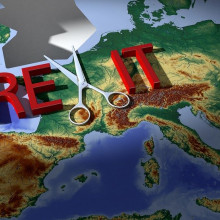
11:24 - Science and Brexit - what next?
Science and Brexit - what next?
James Wilsdon, University of Sheffield
To Brexit now and the question of to what extent departing the EU will affect UK science. James Wilsdon is professor of research policy at the University of Sheffield, and he spoke with Chris Smith...
James - Although of course the UK left Europe, as of last Friday at 11 o'clock, science is one of those areas where, of course, we've had traditionally over the last 30-40 years a very strong and growing set of connections. We take in the UK just shy of 1 billion euros a year of funding from different European sources towards research. Around 60% of all the UK's internationally co-authored papers are with European collaborators, and 13 of the 20 countries with which the UK collaborates most intensively are in the European Union. So these connections are very important to the overall health and vitality of the UK science innovation system. What we need to know as the science community is, well where does all that stand out the end of this next 11 months? And that's the thing that is still somewhat up in the air.
Chris - Of course, the flip side of all of this, you're saying, well a billion, that's a significant amount of funding. On the other hand, that does mean, given that we spend maybe 9 billion a year on research in this country, that that's only about 10%. So you could say, well actually, 90% of the expenditure is the UK already and we're not seeking to reduce that are we?
James - No, that's a fair point. And actually it's even less than that because a fair portion of European money isn't going into the academic research base, but into R&D collaboration with industry. So you need to put the billion a year from Europe into the 30 billion that we spend in the UK as a combination of both public money and private sector R&D, which brings it down to about 3% of the total. That, as you say, doesn't sound a great deal. But if we go back into the academic domain, there are quite uneven patterns of that spending. There are certain scientific disciplines, for example software engineering, archaeology, and various others where the proportion of total research money can be as high as 30%, added to which you've got all of the additional benefits that come from being part of these collaborative networks. It's wrong to see it just as a matter of pounds, shillings and pence as it were. We need to see it also as a matter of the opportunity to participate in often large scale projects, which are increasingly where the real engine of contemporary science is. It's often these larger scale, more collaborative projects, which are doing much of the most cutting edge work.
Chris - The UK has been a very big investor though in some European collaborative projects. Things like the LHC, various genetics initiatives that exist in Europe, but they're not actually EU initiatives. So there's nothing to stop us continuing with those collaborations to continue to invest in those collaborations and to continue to reap rewards from them, presumably?
James - Yes. So CERN, as you say, where the Large Hadron Collider is based is a good example of a collaborative endeavour which sits outside, or at least above, the structures of the European Union and there are indeed others. So it's not the only show in town, but of course given geographic proximity and given the existence of pan-European funding schemes for such a long period, and the fact that those have been built up progressively to become what I think on any reckoning is the most effective funding instrument for international collaboration in research, removing oneself from those networks in their entirety would be at the very least a rather self-defeating move.
Chris - It does work both ways though, doesn't it? Because you know, Britain is a powerhouse, scientifically speaking. We are the go-to people for certain aspects and certain elements of science. So it would certainly be in the EU's interest to want to talk.
James - Oh absolutely. And that's of course the message that's coming across loud and clear from our scientific collaborators in European universities and research funders. And of course the message that's coming from the UK system. So I think that argument is well made. The challenge is just getting there and there have been good attempts to try and work out how we do this. There was a very helpful report that came out last week from the Wellcome Trust, which actually reported on a sort of simulated version of the negotiation process. So they got experts from both sides in a room and kind of ran the negotiations on science as if they were really happening. Really to try and see whether one could reach an agreement on science as a specific area of focus, sort of off to one side of the wider trade and economic negotiations. And you know, that of course remains an option. One could sort of decouple the science piece from the bigger discussion and just try and deal with that over here given it's an area where there's high degree of consensus. The difficulty again comes in whether there's the sort of political will to do that in the wider political context of these talks.
Chris - What about collaborations beyond Europe though? Or are they already maxed out? Can we not just say, well look, there are plenty of other extremely scientifically powerful countries, Australia, America, the far East, there are plenty of other potential collaborators out there, we'll just work with them instead?
James - Well indeed, this is of course another way through this if we can't resolve the European question. Of course, it's not a zero sum game and ideally you have a collaborative science system that is connected both to your more immediate neighbours in Europe and also to all of the countries you mentioned. And there's no reason why that can't be achieved. But yes, if you can't resolve the European question, you could of course look for ways of scaling up the volume of collaborative work with the United States and with other big research economies, including those you mentioned like Australia and Canada. So there are lots of possibilities. The UK actually has been doing quite a lot, separate from the whole Brexit debate, already to scale up collaboration through various funding lines, particularly in terms of collaborations with developing countries in the global South. But we start from a position where right now 60% of all internationally coauthored papers from the UK are with European authors and 13 of the 20 countries with whom we collaborate the most are in Europe. So research and research funding is not something that can kind of turn around overnight. These are big complicated systems involving lots of moving parts and you can't kind of flip it on a whim to a different orientation. We need to be I think building in all of those directions progressively over time, but we can't quickly or easily afford to lose the European piece in that jigsaw, which has been absolutely critical to the kind of scientific success that we've seen over the last few years.
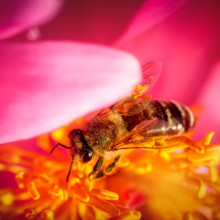
18:10 - Love is in the air... so are bees
Love is in the air... so are bees
Steven Poyser, Cambridgeshire Beekeepers Association
With the love hearts decorating shop windows, and meals for two advertised in restaurants - you’ve guessed it, Valentine’s Day is around the corner! Katie has this report...
Katie - If you think your love life has it tough, spare a thought for the humble honeybee. Romance is hardly the buzzword when it comes to bringing new bees into the world. So, perhaps, it's rather surprising that allegedly Valentine's day and bees share a few things in common.
Stephen - One of the patron saints of beekeeping is Valentine. The word honeymoon is believed to come back from the ancient German, specifically used for the feeding of honey to the groom at the time of their wedding for one month or one moon cycle in order to build their strength up to produce a strong and healthy family.
Katie - Bet you didn't know that! That was hobbyist and expert beekeeper, Stephen Poyser from the Cambridgeshire Beekeeper's Association. He told me all about how honey bees find love.
Stephen - This time of year, being February, there are no males at all in the UK. The males are only created when the colony requires some males, so they won't produce any until March or April. They are produced from an unfertilized egg. So there is no father to a male. Queen lays the eggs 24 days later in the hive. They hatch, they then wait a little while to build up some strength. They're lounging about. They don't do anything in the hive at all. They don't process honey. They don't collect nectar. They don't collect pollen, they don't feed any bees, they don't make any wax. They do absolutely nothing in the hive. Just eat and lounge about just waiting for their time to become sexually mature in order that they can then become what their purpose is.
Katie - In the meantime, what are the females doing?
Stephen - All the workers are females and there is only one queen. A bigger bee being the queen is fed better food in a larger cell in a vertical position to become a queen, and if it's only in a worker cell, it will become a worker. If for the first three days of its life, the queen is killed, the colony can convert any one of those young larvae and they can produce an emergency queen.
Katie - Hmm. Doesn't sound like female honey bees get the best deal. Chances are you'll be a worker putting in all the effort, whilst the males just slob around. The queen once sexually mature, exudes pheromones and then flies into a crowd of sexually mature male drones and they chase her. The fastest flyers get the privilege of mating about four or five per flight, maybe for three or four days. Mind you, being a male honeybee isn't exactly a picnic.
Stephen - Unfortunately for the males, the ones that are successful and catch the queen, when they mate with her, their genitalia explode and they drop to the ground dead. Uh, it's a one off experience for the male! And when the successful males have mated, the ones that are unsuccessful basically then go back to their own hives or to other hives because they are allowed in and they recuperate. And then, off they go in again in the next few days.
Katie - Ouch. And what about the queen and all this?
Stephen - When she's in full production, she could be laying 2000 eggs a day. In the spring, each one will be fertilised. So those will become workers, which is why within a beehive you can have some bees that are slightly gingery, some that are black and some that are a bit more stripy because although they've got the same mother, they may have a different father. The queen will live for up to three years. All of those eggs that are fertilized are with semen that she has collected during her mating flights at the start of her life. That is a phenomenally long time and it is a huge number of sperm that she actually holds, which is why the period of mating is so critical for the bee because if you get bad weather, then they can't fly, they can't get mated, and colonies are in trouble. And that is a major issue with bees at the moment. The, uh, reproductive ability of the queens seems to be declining. They are not living quite as long and not producing as many bees because if they are unproductive, the workers will actually replace her with a new queen and get rid of the old one.
Katie - Charming. So perhaps honey bees won't be cast as Hollywood romantic leads anytime soon, but at a time when pollinators are feeling the pinch, what can we do to spread the bee love this Valentine's day?
Stephen - The best thing that anybody can do if they don't want to keep bees is to provide them with food, and most bees can find food during the summer. Spring is the critical time. So anybody who has a small area of land, if they can plant something that's going to produce pollen in particular for January, February or March, that is the critical thing for bees. They can store nectar in the form of honey through the winter to keep them going in the spring, but they can't store pollen as well. It's the protein they need in order to build up their young larvae.

23:36 - Mailbox: Can hot chillies cause harm?
Mailbox: Can hot chillies cause harm?
This week, Pavel got in touch with a question about chillies...
Adam - And now it's time for the mailbox where we look at the things that you've been sending into us. And we've gotten this question in from Pavel and they say that during another program it was mentioned that chillies can dock on the same receptors that feel heat. And this gives the eater the feeling that the food is hot, and that's why chilli burns. These receptors should actually protect us from burning our tongue and our mouth. So what physical effect is there from the ingestion of too much really hot chilli? Can it actually burn you or in some other way damage your mouth. And is this only a feeling that'll pass away without any injuries? So Katie, can chillies actually be dangerous? I love my spicy food. So a little concerned.
Katie - This is really interesting and selfishly it's very pertinent timing for me because I'm trying to bolster my capacity to handle spicy food, starting from um, baseline, shall we say. The thing that makes chillies hot is a molecule called capsaicin. This molecule activates pain neurons, so it's sending an "ouch, this is hot" signal to the brain. And this happens regardless of whether or not it's temperature heat or chemical "heat". So the body essentially doesn't care what type of heat it is, it's just going to go into self defense mode. So maybe sweating or inflammation or - even in severe cases, I've heard about - vomiting.
According to a BBC Futures article I was looking at, eating hot hot chillies is unlikely to do any lasting harm, but it can have some pretty unpleasant and pretty intense side effects. So I think I'll be sticking only to what I can handle. And I imagine you'll probably be doing the same right?
Adam - Probably. But I think I've a slightly lower sense of self preservation than you do.
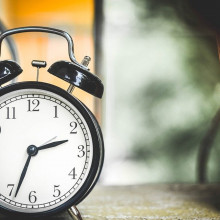
25:46 - What is the body clock?
What is the body clock?
What exactly is the body clock? Megan McGregor has been finding out...
Megan - How do we know when to wake up without an alarm? Why don’t we just keep sleeping? For that we have our body clock to thank. It's our body’s way of keeping track of time to coordinate vital functions like metabolism, when we eat and when we grow and repair our tissues.
The body clock is powered by a cluster of nerve cells called the supra-chiasmatic nucleus, or SCN. This rice grain sized structure sits in the brain's hypothalamus.
The SCN "ticks" like a genetic domino effect: a series of genes turn on and off in sequence, producing proteins that turn on the next gene and turn off the first one. The whole process takes about 24 hours to complete the genetic cycle.
The clock's time is updated by signals sent from the retina, which uses daylight to reset the system. This is how we adapt to jet lag.
The SCN transmits the time signal to the rest of the brain through connections to other nerve cells, and to the rest of the body by controlling the release of the hormone cortisol from the pituitary gland.
The cortisol signal is carried through the bloodstream to pass on the time signal to every cell in the body. This means that literally every one of our organs knows what time it is, and metabolism is efficiently synced up in all of them, helping us to perform at our best each day...
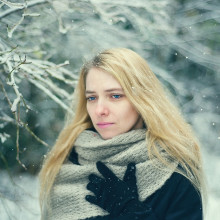
SAD and the brain's calendar
Jennifer Evans, Marquette University
The body doesn’t just keep time with clocks, it also uses calendars. And the changing seasons can mean that the amount of light available is in short supply in the winter months. Estimates are that around 6% of the UK suffer severely from seasonal affective disorder. It’s a type of depression that comes and goes with the seasons, and up to 80% of sufferers are female. But exactly what’s going on in the brain of people suffering isn’t well understood. Now, scientists at Marquette University in the US have found that, when the brain’s internal calendar gets stuck in a summer mode, perhaps this can prevent SAD, and this might be what’s happening to everyone not affected by the condition. Chris spoke to study author Jennifer Evans to find out more...
Jennifer - The take home of our work is that if the brain becomes stuck in a summer mode, it may be a way to avoid catching the winter blues. There's a small part of the brain that basically acts as a calendar. It knows what time of day it is because the cells of this part of the brain make certain proteins, and so the proteins get turned on and then they turn themselves off. So you can tell what time it is just by knowing how much of this protein is made at any given time. The way it tracks seasons is slightly different. It's the whole group of cells that act together and kind of coordinate with one another. So in the winter they're doing the same thing at the same time. And so it's kind of the short, brief signal to the rest of the body. And that matches the short days of winter. But in the summer when the days get longer, these cells kind of spread out and they're doing things at slightly different times. So as a group, they're signals the rest of the body. When the signal is short, it's winter. And when it's long and spread out in duration, then it's summertime.
Chris - You don't mean the cells physically change position, you mean as in the stimulus, the signal that they are emitting to the rest of the brain and the rest of the body is spread out over a longer period of time in the summertime? But in the wintertime it's a narrow focus, signal on signal off?
Jennifer - Yes, exactly. So it's the duration of the signal. In winter it would be short and in summer it would be long.
Chris - Are all the cells in the body clock the same except they behave differently, or actually are there different populations of subtly different nerve cells in there? So it's natural for them to divide into subpopulations and have this more smeared out function when the days get longer?
Jennifer - No, they're not all clones of one another. And we can recognize and kind of classify them into different groups based on the chemicals that they produce. So every single cell in the brain's clock can tell what time of day it is, but they express specialized chemicals and proteins that we use to kind of classify them into different groups. And they tend to form two main clusters that we can distinguish chemically.
Chris - And what are those clusters and how does that affect the behavior of the whole population in summer compared with winter?
Jennifer - The two clusters, we tend to kind of distinguish them chemically and spatially. There's a core cluster that's kind of in the centre of this structure and this is the part of the clock that actually receives light input from the eye directly, but then it transmits and communicates this information to the surrounding cells. And so it's these two main clusters, the light receiving group versus the downstream group that separate and reorganise their relationships in summertime.
Chris - How did you make this discovery then? How did you identify that you've got this going on?
Jennifer - Well, we used a genetic trick that was developed by Joe Takahashi. They used a firefly enzyme and they attached it to a protein that's made every day. And so we can tell what time of day it is in a cell, all we have to do is take pictures of how much light it produces. More importantly, we can take pictures of hundreds of cells all at the same time. So we can see kind of how they're co-ordinated in space and time as a population. And so we exposed this special transgenic mouse to either a standard laboratory condition or these long summer days. And so under the standard condition, the cells were nicely co-ordinated and synchronised, basically doing the same thing at roughly the same time. But in the summer, these two spatially distinct clusters of cells do very different things. And so what happens is they're basically working opposite shifts. So one group will turn on and they'll glow and then they'll diminish and then 8 to 12 hours later the other group will turn on. And so they're normally unified, but in the summer they break into these two very different groups that are representing these specialised cells.
Chris - It's like having a watch on each arm, and the watch on the right arm goes forwards, and the watch on the left arm goes backwards. They are sort of the mirror image of each other.
Jennifer - That's a really nice analogy. So what I would say is it would be like, yes, having a watch on both arms and one might be set to Hong Kong time and the other would be set to 12 hours later.
Chris - But why would the brain want to do that? What's the benefit of that?
Jennifer - We don't yet know enough about what these two groups are doing and how they're communicating. So it may be the case that one group of cells kind of starts and it's kind of like turn on, So maybe it communicates with the structure downstream that controls your sleep and it says, "Hey, wake up". And then the other group of cells 12 hours later says "Go to bed". So they may be very distinct in terms of the types of signals that they're providing and if they're spread out in time, then you would have sleep grow longer or shorter. That's kind of speculation. We don't exactly know why it would adopt it this way. And I think really the heart of it is we need to know more about what these cells are doing and how they're communicating with the other parts of our brain and body.
Chris - Is it that when the days become very, very long, actually it's quite easy for the clock to get dis-regulated because actually when you should be going to bed, you might not feel the urge to go to bed because it's still quite light? Whereas if you've got a double push, a clock to wake you up in the morning, but one to put you to bed at night, it can overcome some of the difficulty of having a very long, bright day?
Jennifer -That's a possibility.

35:04 - What time is breakfast?
What time is breakfast?
Shantel Lynch, Surrey University
Breakfast! They say that it’s the most important meal of the day, but could when you eat, rather than what you eat, be a way to manage your weight, and overall health? Dietician and PhD student Shantel Lynch from Surrey University is asking exactly this, and she spoke to Katie about the concept of time restricted eating. First up though, with Katie being pro-breakfast and Adam anti-breakfast, who is correct? Katie put this to Shantel...
Shantel - That's a complex question in the sense that everyone's slightly different. So our genetics may predispose us to be either a morning type, so like a morning lark, or a night owl. And that may actually influence our decision as to whether we want to eat in the morning versus whether we went to eat later on in the day. Now, we don't know just yet whether there's a right or wrong answer in terms of when we should be eating, but we do know that during the course of a day, there are some variations in how we process our nutrients. For example, if you have a meal that contains carbohydrates, our bodies will break that down to glucose or sugar. And we know that if you have this same meal in the morning, versus if you have that same meal in the evening, our bodies find it a bit more difficult to manage it in the evening time.
What happens is that we have a higher peak in our blood sugar levels if we eat that same meal in the evening and that peak in blood sugar stays higher for longer. And if you have elevated blood sugar levels for a long time, we know that this perhaps can predispose you to things like type two diabetes. So we know there's variations in how our bodies process nutrients, but we don't know exactly the mechanisms behind it.
Katie - OK, so you're looking specifically at the time of day you're time restricting eating to, as it were. But in general - full disclosure, I've actually been trying time restricted eating for a few weeks. What's the evidence it's doing me any good?
Shantel - The evidence base isn't huge at the moment. There are pilot studies, which are small-scale studies in small numbers of individuals. And this research is coming up with some positive results that restricting your eating window is having positive effects on your weight, the way that we process our nutrients, the way we managed our blood sugar levels, how our body fat is distributed, perhaps things like our blood pressure as well. So there is some really positive evidence out there. However, they aren't large studies and there's not a lot of them. So it's too early to say for sure whether it's definitely a good thing for everyone, or for the majority. We do have to wait for some more research to come out.
Katie - And do we know much about whether eating later or earlier is better, at this stage?
Shantel - In humans, there is some emerging evidence that perhaps eating early in the day may be better for you, but these studies are in small supply and in small groups of individuals. So because there are some promising results that perhaps eating earlier in the day may actually help you to manage your weight better, it may help you manage your blood sugar levels better, there is some new research coming out trying to explore this a lot more. We do hypothesize that actually eating early in the day will be superior, but we don't know for sure until we've kind of got those results through. Some of the research that I'm doing is actually exploring the chronotypes of my participants as well, so that we can actually see, does this have an impact on when you should be eating? And should we be tailoring dietary advice to whether you're an early type or an evening type? Or does it not make a difference at all?
Katie - Are there particular groups of people that you would be interested in trying this time restricted eating diet on?
Shantel - The group of individuals that I'm looking at in this study are those who are at higher risk of developing type two diabetes. Some of the animal evidence showed that time-restricted eating may actually be protective against obesity and type two diabetes. So does this translate to humans as well? Does it have an effect on what we know are risk factors for type two diabetes like your weight, like how you manage glucose? Does this work for this group of individuals?
Katie - Do we have to be a little bit careful here Shantel, because if anyone is doing any diet, I guess you have to control for perhaps the possibility that we might just be thinking more about food and therefore eating a bit less anyway?
Shantel - There's so many things that you have to think about. Simply by saying you're putting someone on a diet, it may mean that even if they are given the eight hour window, they'll probably just try to eat as much as they can in that eight hours. We do need to be careful and we do need to be mindful in that sense, which is why we're looking at a variety of different outcomes, how it affects social interactions, psychological wellbeing, whether this type of eating leads people to overeat because they're actually told they've only got eight hours to eat? Does it affect how they feel because they're missing out on social events, due to not being able to eat at certain times? There's lots of things to consider. So there's not just one clear cut answer here.
Katie - As a dietician, is time restricted eating a diet you would recommend?
Shantel - We're not at a stage where we are recommending it to all different groups of individuals, because you have to remember that if you've got a particular health condition, it may not actually be appropriate to fast for long periods of the day. We need to look more at really does this diet work? Who does it work in? What impact does it have on people's lives? There's no point recommending a diet that people can't stick to in the long run. And then we can then say, is it realistic to get this advice? And what groups of people do we want to give this advice to? But as this evidence starts to come through, we are drip-feeding it into advice and supporting people with this type of diet if they want to do it. But I would say before doing anything like this, please do speak to a healthcare provider and check that it is actually safe to do so.

The old post lunch slump
"Why do I feel sleepy after lunch?" Melanie Jans-Singh has been looking into exactly this...
Turns out that sleepiness after lunch isn’t necessarily related to whether you had a high carb pasta dish or a light salad (although a big lunch might exacerbate it). Some people experience a period of afternoon doziness regardless of whether they’ve even had lunch, and it’s related to your body clock.
From the moment you wake up, your body starts, little by little, wanting to go back to sleep; and the later in the day it gets, the more this “sleep pressure” builds up. You also have an oscillating, roughly 24 hour, pattern of wakefulness; your alertness peaks around the middle of the day, and drops as the afternoon progresses and sleep pressure builds. It’s the growing difference between these two signals that can provoke an afternoon slump.
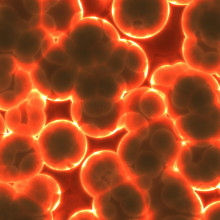
42:19 - Turning off immune cell clocks
Turning off immune cell clocks
David Ray, University of Oxford
Like many body systems, the immune system activity changes throughout the day. And by setting out to better understand our body defences’ daily rhythms, Oxford University’s David Ray and colleagues recently showed that actually turning off the clocks in cells called macrophages made them better at combating pneumonia-causing bacteria in mice. First up, does varying immune system activity mean us humans are more or less vulnerable to infection at different times of the day? Katie put this to David...
David - That's almost certainly true. We don't know that for sure for people, because clearly it's quite difficult to know if someone's wandering around when they're going to come into contact with a virus or bacteria. However, we've been able to use an animal model to test that. And we also know from doing studies in people that, for example, immunisation works differently depending on the time of day at which you're immunised. There was a nice study published looking at seasonal flu immunisation in older people, and showing that those who were immunised in the morning got a better immune response, better protection from flu, than if they were immunised later on in the day.
Katie - You've had a recent paper published, which is talking about turning off body clocks in the immune system. It seems a bit counter-intuitive. Why are you doing that?
David - So we started off with this piece of work really to try and address the role of a clot in a particular immune cell called a macrophage. So we first of all did some studies where we showed that the response of a mouse to the encounter with a very common bacterial cause of pneumonia was different depending on the time of day at which the bacteria showed up. We stopped the clock in these immune cells (the macrophages) to see if we could interrupt that time of day effect. Which we did. But then we were really surprised. First of all, we noticed that when we stop the clock just in the macrophage, all the other clocks in the mouse are working completely normally. The mouse looked completely normal, slept at the right time, ate at the right time, but was protected against getting pneumonia. In almost all the previous work that we and others have done, if you interfere with the operation of the clock - which let's be clear, it has been with us ever since bacteria emerged as a life form on the planet, all bacteria, fungi, plants, animals have all got timing systems - and almost always when you interfere with that, something bad happens. I think this is the first time that stopping the clock in a cell has resulted in a beneficial gain of function.
Katie - And what is that beneficial gain of function?
David - So it makes the macrophages change from being in a sort of rested, quiet state to being in a sort of vigilance state. So they look different and they're sort of already primed to fight off bacteria. So they move around more rapidly, they chase down bacteria more rapidly and they engulf, digest and kill bacteria more rapidly.
Katie - Do you know why their macrophages have this behaviour, this kind of restful role relative to that other activity?
David - We're always engaged in a sort of battle with the bacteria that live on us and are surrounding us all the time. The problem with having macrophasias in a vigilant state all the time is that although you get some additional protection from bacteria infection, there may be friendly fire damage to other cells, other tissues in the body. So we think what we've stumbled on here is part of the mechanism that allows the body to be primed to fight off infection at the time of day when it's most likely that infection will take place and that then naturally at the time of day when the body is less likely to be infected, the immune system switches down to a more resting state to allow tissue recovery.
Katie - Oh, I see. And is that morning versus afternoon?
David - Yes, that's exactly right. Yes. We think what's happening in the bacteria, the infection of a mouse is nocturnal (so it's active at night). We have to sort of remember that and, and sort of switch it around, to what's happening in people is that, um, it looks like the macrophages are more vigilant and more primed to fight against infection at the start of the active phase.
Katie - Does this have translational potential? Using this knowledge to benefit human health?
David - Well, potentially, yes. So at the moment the fight against bacteria is largely being won by the bacteria. There have been no new chemical antibiotics for 30 years. Multidrug resistant bacteria are a real problem. Now, if we could tap into this mechanism that we've discovered, which regulates the antibacterial activity of the immune system, we may be able to activate it or unmask it in order to allow us to use our own natural defenses more effectively.
Katie - All this assumes that your body clock is working as it should do, but if you're in hospital, that might not actually be the case and I understand you're doing a bit of work on trying to kickstart body clocks in people whose body clocks aren't working very well. Our body clock is kept in time with the light dark cycle, mainly through sunlight exposure to the eyes.
David - If people are in a hospital, they won't be getting bright sunlight. Also in hospitals, particularly in intensive care units for example, there may be no windows, there may be lights on during the night as well as during the day. And people are often fed in a rather sort of a odd way. So people can be fed continuously by using tubes into their stomach, for example. What that means is that people lose any external cues as to when it's daytime, when it's nighttime. And we think that there may be an advantage to sort of restarting the body clock in order that our immune systems, our energy metabolism can again work optimally.
Katie - These external cues, are they only relevant if you're conscious?
David - Uh, no, they're also relevant if you're unconscious. Interestingly, so the argument is that, uh, if someone is sedated, uh, heavily sedated, they may have their eyes closed for example, but there is sufficient light that still gets into the retina even if the eyes are closed for there to be a signal to the brain to tell you when it's day or when it's night. And the other way, uh, we get cues as to what time it is, is through feeding information. Our immune system, our livers and so on, are all kept in time by having food signals from the gut. And again, if people are in hospital, frequently you find that they're being fed in a continuous basis throughout the 24 hours via a tube into the stomach.
Katie - So what can you, and what are you trying to do about it?
David - At the moment, we're still gathering evidence for what sort of trials we'd like to do. Among the trials we're interested in is looking at the effects of altering light intensity and also, uh, restricting foods so that people have a distinct fed period and a fasted period, which is very much how we operate when we're feeling healthy. And well, we think one of the consequences of circadian disruption, and when we bring people into particularly intensive care units, it's a very disrupting environment, is that none of the normal systems work very well, which means that not only does it take longer to recover from whatever the original insult is, but the longer you're there, the more likely it is that other systems start to go wrong.

50:16 - Getting ready for bed
Getting ready for bed
What's happening in your body when you're winding down for the evening? Phil Sansom has been finding out...
Phil - You’ve had your dinner, and it’s getting late. And while you may not want to turn off the TV, your body is busy getting on with the business of sending you to sleep. In the absence of sunlight, your brain starts releasing a hormone called melatonin that makes you sleepy.
And is it getting a little chilly in here? As you get sleepy, and while you sleep, your core body temperature can drop by as much as 1 degree C. As for why this happens, it still remains a mystery. There is some evidence to suggest that this cycling of the body temperature helps to set the clocks of other systems in the body. Or it could be that it’s just more efficient from a metabolic perspective to be asleep and using the least energy when it’s cold outside.
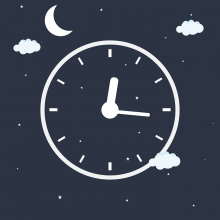
51:13 - Why sleep is so important for cognition
Why sleep is so important for cognition
Jason Rihel, UCL
What's going on in the brain when we nod off? And how does the brain know to wake up again? Adam asked this of Jason Rihel from UCL, who's looking at sleep in the context of dementia...
Jason - In addition to your body clock, you also have a timer that's telling you how long you've been awake, and that builds up as sleep pressure and that then signals onto neurons in your brain that control when you're going to be asleep and awake. These are neurons that also live in your hypothalamus and they're sensitive to some signal in your brain that's accumulating when your brain is active. We don't know what that signal is, but we do know that once these neurons get tripped to become active, they signal to the brain, it's time to be asleep.
Adam - And then on the other side of that, when I've been asleep, how does the brain know to wake up?
Jason - Once you've gone to sleep, this pressure to build up, whatever it is, it's either the depletion of something or the accumulation of something. Then that can reset during sleep. By the time you are ready to wake up in the morning and your body clock is saying, Hey, it's time to be awake. You also no longer have this sleep pressure.
Adam - It's nice to wake up naturally. Usually it's my cat deciding he wants more food, but when I don't sleep well the night before, I feel really awful. So what is not sleeping enough doing to my brain, to my cognition?
Jason - It's very clear that after a night of sleep deprivation or poor sleep quality, you have immediate effects on your cognitive ability. For example, if I give you a vigilance test where you have to respond to maybe a flashing light on a screen, you will make more mistakes and you'll have a slower reaction time. But we even see this in statistics in society where for example, the number of car crashes due to sleepy driving is estimated to be in the thousands with hundreds of deaths estimated a year.
Adam - What about something like dementia, a disease that affects cognition? How does not sleeping well enough affect something like that.
Jason - We've been studying some aspect of this through a grant that I got from the Alzheimer's Research UK, in which we've been studying some of the molecules that build up in human brains of patients with Alzheimer's disease. There are two main molecules. One is called amyloid beta and another one is called tau and these form these plaques, proteinaceous tangles that build up in your brain when you have Alzheimer's disease. And what people have shown, in both animal models and in humans, is that these molecules are secreted by neurons when you're awake, and so the levels of these molecules go up during wakefulness, and then they dissipate during sleep. One idea is that this is through a kind of washing machine of the brain, in which the interstitial space, that's the space between the neurons becomes more confluent with the cerebral spinal fluid that bathes the brain, and that allows for the flushing out of some of these toxic byproducts.
Now, one potential consequence of that idea, is that the longer you are awake over your lifetime, the chance of building up more and more of these byproducts goes up, so that the chance that you will make more of these damaging plaques will increase the longer you are awake over, of course, a lifetime. And so then one possibility that will happen, is these plaques will then begin to damage some of those neurons that are sensitive to the sleep pressure. That's the signals of the brain to say, it's time to go to sleep. You then might get into this vicious cycle situation, this build up of the amyloid beta and tau while you're awake. The buildup of this into these damaging plaques, they then damage some of the sleep promoting centers of your brain, causing you to be awake more often once you start to get dementia. And then that leads to the buildup of more of these materials, and the buildup of more plaques which then lead to more damage and so on and so forth.
Adam - Does that mean we might be able to use sleep to say prevent dementia or even treat it?
Jason - It's certainly a tantalising possibility that good sleep hygiene will improve your longterm cognitive health. Maybe slow the progression of dementia. Certainly in animal models, people have shown that if you force an animal, the model of dementia, to sleep more over its lifetime, they will accumulate fewer of these damaging plaques and show a slower cognitive decline. Now, whether or not that will work in humans, we don't really know. Basically every neuropsychiatric and neurodevelopmental disorder that you can name, that these also have, sleep problems accompanying them.
And it's still an open question on: Is sleep a contributing factor to this or is it a consequence?
Adam - So, having reflected on the programme, what do you suggest we do to better our own health, through our body clock?
Jason - Just having good sleep hygiene helps a lot. Having a set bedtime where you stick to it, having a time that you get up in the morning and sticking to it, and preparing yourself for a good night's sleep by beginning to wind down and sort of shut yourself off from the world prior to your natural bedtime, for example, shutting off some of those screens, turning off your computer and your phone, and kind of having a relaxed period before you try to go to sleep.










Comments
Add a comment